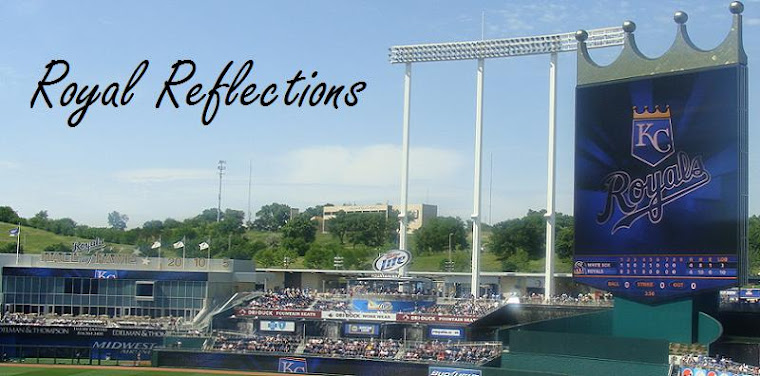I’ve been trying to figure out what irks me so much about the two recent articles about Dayton Moore defending “the process” and subsequently defending his actions since becoming the GM. I’ve never believed Moore to be arrogant, and up until a few months ago, I haven’t questioned a lot of his decisions. He needed time to rebuild a team that has been run into the ground over the past 20 years.
Moore looked to be stockpiling good, young arms, and for the most part, fans could see that and were patient. He told us that he was going to rebuild this team around high character guys who played the game the right way and we nodded in agreement. He began using the phrase “the Royal way” tapping into the emotions and beautiful memories of Royals fans who are old enough to remember the glory years—when there actually was a Royal way. We heard and read analysts say that Moore looked to be turning things around in KC. And who can forget Moore saying before the season started that this was the best lineup the Royals have had since 1994?
There were some inconsistencies with Moore’s stated intentions along the way: the acquisitions of Jose Guillen, Ryan Freel, and Sidney Ponson to name a few. And then there was Moore’s stubbornness to keep guys like TPJ on the roster way longer than he should have. But, for the most part, we trusted him. He knows these guys far better than we do. Surely, these apparent contradictions would turn out okay—or, at least most of them would.
We knew we were going to have some issues at the back end of the rotation, and that the team had some defensive issues, and that the offense lacked punch—even with Mike Jacobs in the lineup. But we had a good rotation, a great closer, and belief that Moore could put together another solid bullpen. We had visions of Coco Crisp getting on base early and often. We figured that either Billy Butler, Alex Gordon, or Mark Teahen—hopefully all three—would put together solid offensive numbers. And somehow, it would work out.
I don’t think most fans had any illusions of this team winning the World Series, but in a division in which you only need to win around 90 games to win it, we hoped the Royals would stay in contention. If not, we were simply hoping for a competitive team. Early in the season, a poll here at Royal Reflections showed that 51% of those who responded believed the Royals would win 81-90 games; 22% believed the Royals would win 71-80 games; and 12% believed the Royals would win 91+ games. The number of people taking the poll wasn’t large enough to really mean anything, but a few diehard fans expressed their optimism.
We had hope. And the fast start in April fanned the flames. We lost Alex Gordon to an injury, but Teahen was fine at third base and we still had a good month.
Along comes May and the Royals started losing. A few fans began to say that this was the same old Royals. I disagreed and wrote a post titled 10 Reasons Not to Jump Off the Bandwagon. By late May, we lost Mike Aviles for the season and the offense was struggling to score runs. The defense was breaking down too.
By June 3, I came to the conclusion that indeed this really did feel like the same old Royals. On June 12, we had the classic post by Rany titled “The Five Stages of Being a Royals Fan” and by then, most of us sensed that this was going to be a long summer—again. We didn’t like it, but we’ve grown used to it, and besides Moore knows what he’s doing. He’ll get it figured out.
By mid-June, we lost Coco Crisp for the season and we were seeing some of the worse defensive baseball imaginable, causing us to wonder if Moore had even considered defensive skills when he acquired so many of these players. Then came the embarrassing sweep at home against the Cardinals in which the Royals were outscored 29-11.
In early July, as we began to openly question some of Moore’s decisions, Ranygate broke, causing us to wonder just what in the world was happening behind the scenes at Kauffman Stadium that would prompt such a reaction.
The following week, news came down that Moore had traded two pitching prospects for Yuniesky Betancourt. As I’ve said here a couple of times, that was the tipping point for me regarding Moore. The move caused the Royals blogosphere to explode with wonderment over acquiring a guy who doesn’t get on base and has a low fielding percentage. Throw in the fact that the Mariners wanted to get rid of him and that he isn’t exactly known for having a strong work ethic and our complaints seemed justified.
At that point, the Royals were terrible in every facet of the game, save their starting rotation and closer. Not bad—as in we what have seen in Kansas City in recent years—but terrible. Then, on July 22, comes Bob Dutton’s article in the Star, Moore has no doubt that Royals are on the right track for long-term success. In it, Moore tells us to “trust the process.” He doesn’t really explain the process, although most of us thought we understood it to be what I outlined above (good young arms, guys who play the right way, guys who get on base, etc.).
After pointing out the injury problems the Royals have had this season, Moore said this in Dutton’s article about the team he put together for 2009:
“This is the funny thing about this job,” he said. “People think we’re idiots. Don’t you think we start with the very best (free agents) and talk to those players and talk to their agents and see what their interests are?
“There is talent here. We have some players who have to step up. Ultimately, it’s about players coming out and performing. We’re going to keep the group we have, and we’re going to work. That’s the only way I know how to do it. It might not be the right way, but it’s the only way I know how to do it.”
The truth is, we really don’t think you're idiots. But when you say one thing about the type of players you want to acquire and then do another, what are we supposed to do? We don’t have any expectations of top tier free agents coming to Kansas City. We just don’t want castoffs and guys who don’t understand how to play the game. We’re tired of guys who don’t understand how to hit the cutoff man, who are routinely out of position when taking throws at the bags, and who don’t understand situational hitting.
Here’s the thing—many of us have been fans of this team for decades. We’ve seen success and we’ve certainly seen failure. We’ve been lied to (“We’re rebuilding”—when even the players know that isn’t true). We’ve watched one plan or “process” after another blow up. We’ve endured poor leadership in the front office, poor managers, and players who don’t belong in the big leagues. We’ve been laughed at and we’ve been mocked.
Why put ourselves through it? Why not just tune out and do something else with our summer nights?
The answer is simple: because the Royals are our team. They are part of who we are. We grew up watching them and we’re still watching them. Now we take our kids to see them—but the problem is, we have to explain to our kids that this isn’t the way baseball is supposed to be played. And we tell them about the teams of old—about how they played the game the right way and how it paid off.
So now we have a GM who has been with the organization for three years—not 30 or 40, like many of us—and he’s talking down to us and we don’t like it. It’s too similar to companies we’ve all worked for who hire a boss from the outside, who, three months into his new position, tells his employees that they need to trust him rather than simply being a model of consistency that attracts and earns our trust.
Fast forward to August 4 and we read Dick Kaegel’s article, Royals’ plan didn’t pan out this season. Moore must have heard what fans were saying about his apparent lack of regard for defense when he put the 2009 Royals together because he said this in the article:
“Speed and defense are very important to the success of our team in that ballpark. We understand that, we recognize that,” Moore said. “That’s why we probably drafted and signed as many speed players as we have through the Minor Leagues over the last two years and three Drafts now. We try to draft and sign speed players, because you can’t develop them, and we’re always mindful of trying to acquire players with usable speed and players that can play very good defense.”
At the risk of stating the ridiculously obvious, drafting players with defensive skills for the future is a good thing—but what about the current roster at the big league level? We don’t need to rehash it, but we absolutely knew before we even played a single game that this team was not going to be good defensively. Why build such a team? Sure, there have been injuries, but this team would have been sub-par defensively even if it didn’t incur a single injury—and besides, injuries are part of the game. You have to plan for them. They have to be part of the process.
Let me close with this. Moore should be happy that the fanbase still cares about what is happening with this ballclub. The alternative would be apathy, and frankly, that’s what this team deserves. But we’re still coming out to the ballpark in droves. Moore should be happy that fans are pouring through stats, analyzing trades, and yes, even sometimes questioning his moves. It means we care. We know he does too, but talking down to us isn’t going to help his, or the Royals’, cause.
















